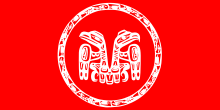
Back هايدا Arabic Хайдаял AV Хайда Byelorussian Haida Catalan Haidové Czech Haida (Volk) German Haida-indianoj Esperanto Haida Spanish Haidad Estonian Haidat Finnish
This article needs additional citations for verification. (October 2007) |
X̱aayda, X̱aadas, X̱aad, X̱aat | |
|---|---|
 Flag of the Council of the Haida Nation (CHN) | |
 Map of traditional Haida territory | |
| Regions with significant populations | |
| Canada | 6,525[1] |
| United States | 5,977[2] |
| Languages | |
| Haida, English | |
| Religion | |
| Haida, Christianity | |
| People | Haida |
|---|---|
| Language | Haida kil |
| Country | Haida Gwaii |
The Haida (English: /ˈhaɪdə/, Haida: X̱aayda, X̱aadas, X̱aad, X̱aat) are an Indigenous group who have traditionally occupied Haida Gwaii, an archipelago just off the coast of British Columbia, Canada, for at least 12,500 years.[3]
The Haida are known for their craftsmanship, trading skills, and seamanship. They are known to have frequently carried out raids and to have practised slavery.[4][5][6] The Haida have been compared to the Vikings of Scandinavia by Diamond Jenness, an early anthropologist at the Canadian Museum of Civilization.[7]
In Haida Gwaii, the Haida government consists of a matrix of national and regional hereditary, legislative, and executive bodies including the Hereditary Chiefs Council, the Council of the Haida Nation (CHN), Old Massett Village Council, Skidegate Band Council, and the Secretariat of the Haida Nation. The Kaigani Haida live north of the Canadian and U.S. border which cuts through the Dixon Entrance south of Prince of Wales Island (Tlingit: Taan) in Southeast Alaska, United States; Haida from K'iis Gwaii in the Duu Guusd region of Haida Gwaii migrated north in the early 18th century. Federally recognized Haida tribes in the United States include the Central Council of the Tlingit & Haida Indian Tribes of Alaska and the Hydaburg Cooperative Association. Some citizens of the Sitka Tribe of Alaska are of Haida heritage.[8]
In a first-of-its-kind deal negotiated over the preceding decades, British Columbia in 2024 transferred the title over more than 200 islands off Canada's west coast to the Haida nation.[9]
- ^ Government of British Columbia. "Haida Nation, Council of The". Retrieved July 5, 2024.
- ^ United States Census Bureau. "2015: ACS 5-Year Estimates American Indian and Alaska Native Detailed Tables". Retrieved October 15, 2020.
- ^ Fedje, Daryl (2005). Haida Gwaii Human History and Environment. Vancouver: UBC Press. p. 128. ISBN 978-0-7748-0921-4.
- ^ Cite error: The named reference
Maschnerwas invoked but never defined (see the help page). - ^ Cite error: The named reference
JGreenwas invoked but never defined (see the help page). - ^ Cite error: The named reference
World Archaeologywas invoked but never defined (see the help page). - ^ "Warfare". Canadian Museum of Civilization. Retrieved March 17, 2009.
- ^ "Culture". Visit Sitka. September 22, 2017. Retrieved May 21, 2024.
- ^ Cecco, Leyland (April 15, 2024). "Canada hands 'long-overdue' title over more than 200 islands to Haida Nation". The Guardian. ISSN 0261-3077. Retrieved July 5, 2024.